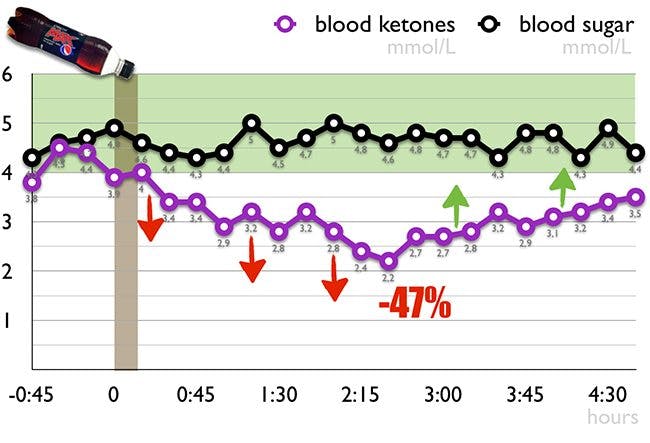Is Pepsi Max bad for your weight?

Can artificial sweeteners from diet sodas affect your weight? My six hour experiment the other day implies that the answer might be yes.
The results can be seen above. I drank the Pepsi Max (17 oz.) after about an hour. The black line is the blood sugar and the purple line is the ketones.
Preparation
When the experiment started I was in pronounced ketosis since several weeks (due to a strict LCHF diet). I was fasting six hours before the experiment started.
The first four blood samples were taken before I started drinking Pepsi Max. Blood sugar and ketones were both a bit above 4 mmol/L (which equals a blood sugar of 72 mg/dl). The small variation in the first tests is probably due to the meter not being more exact (normal for home meters).
During the dark mark I drank the Pepsi (50 cl / 17 oz.), it took 10-15 minutes.
Blood glucose results
As you can see nothing special happened to my blood sugar during the experiment. It stayed at around 4,5 mmol/L (80 mg/dl) and the tiny variation is probably within the margin of error of the meter.
Ketone results
If nothing happened to my blood sugar the effect on my ketone levels were more dramatic. As I noted when planning the experiment one of my suspicions were that the artificial sweeteners might trigger a release of insulin. That would lower ketone levels, as ketones are very sensitive to insulin.
Fifteen minutes after drinking the Pepsi my ketone level appeared to drop, from around 4 to 3,4 mmol/L. Then it continued down during two and a half hours until it had dropped by almost 50 percent.
After that the ketone level started rising again. But when I stopped the experiment, almost five hours after drinking the soda, it was still not back where it had started.
What does this mean?
Pepsi Max and other products with artificial sweeteners are thought not to affect peoples weight, as they contain no calories. That’s an oversimplification that ignores any hormonal effects and resulting hunger. If the sweeteners slow your fat burning and increase your hunger they will of course affect your weight – calories or not.
What is clear from the experiment is that something happened. The ketone level dropped precipitously. My interpretation is that this potentially could result in a decreased fat burning, making it harder to lose weight. Perhaps this is due to insulin release, perhaps not.
I wonder: What if your fat burning is impaired for more than five hours, every time you ingest artificial sweeteners?
One objection: Was the culprit the artificial sweeteners or the caffeine in the soda? This experiment can’t tell, but I would gladly bet money on the sweeteners. Perhaps I’ll do a similar experiment later, drinking black coffee instead.
What do you think about the results?